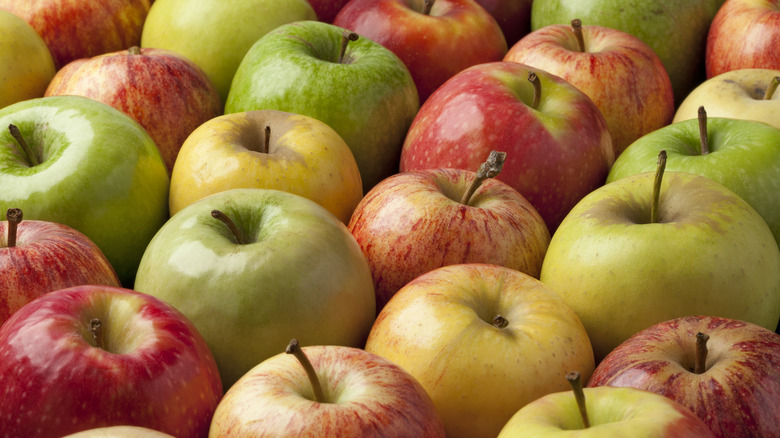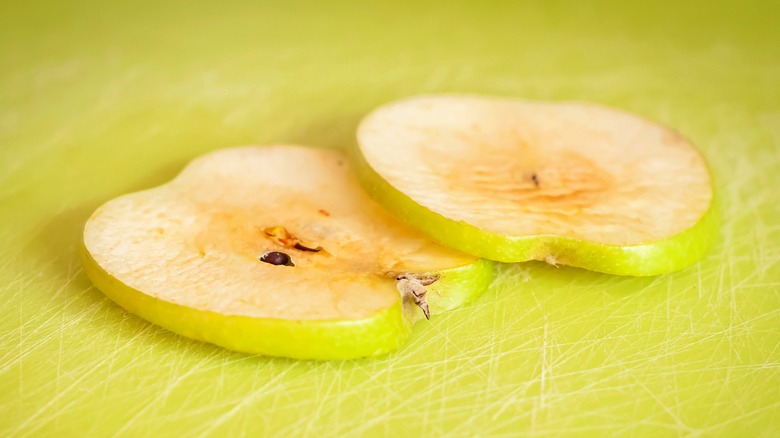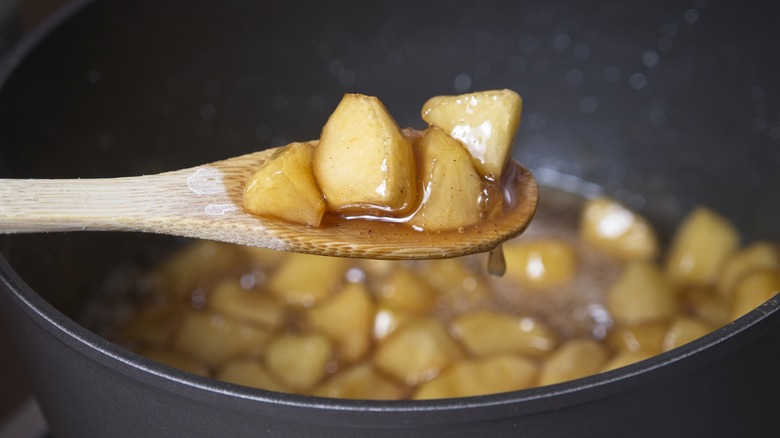The Apple Varieties That Brown The Slowest After Slicing
Brown, squishy apple slices are a sad sight, indeed. Though this discoloration does not affect how safe the apple is to eat, that oxygen exposure that causes browning can change the taste, texture, and certainly the appearance. While there are many tips and tricks that can stave off the inevitable, it might be even wiser to buy apple varieties that are the least susceptible to browning in the first place. This is especially helpful if you want to use apples to meal prep in advance, or on a cheese board that might sit out for a while at a party.
The type and quantity of enzymes present in an apple, along with its amount of antioxidants, determines how quickly it will brown. Varieties such as Pink Lady, Empire, Cortland, RubyFrost, Ginger Gold, Evercrisp, Snow Sweet, Cosmic Crisp, and Ambrosia are good options for apples that will not brown too fast, and many of these can likely be found at your local supermarket.
On the other hand, the apple breed known as Arctic has been genetically engineered so that "the genes that code for the enzyme that causes browning" are "silenced," per the Journal of Young Investigators. Opal apples were also created using gene silencing to prevent browning. Other slow-to-brown types of apples are created by selective breeding and combining different apple varieties that have favorable qualities.
What causes apples to brown?
The browning in apples happens because of a chemical reaction between phenols in the apple and oxygen in the surrounding air, which is accelerated by another enzyme in the fruit called polyphenol oxidase. This causes the apple to produce the brown pigment melanin, which may sound familiar, because it's what creates eye, hair, and skin pigmentation in humans and other organisms.
Technically speaking, you want apples that are low in polyphenol oxidase and peroxidase. Additionally, greater amounts of antioxidants such as vitamin C can also contribute to a slower rate of browning. Of course, you can't exactly go to the store and ask an employee to show you apples that have low amounts of these enzymes. Looking for the aforementioned apple varieties and doing your part to delay browning is key.
Once you slice your apples, try storing them in cold water with the addition of salt, lemon juice, honey, vinegar, or sugar. Acidic lemon and vinegar alter the pH of the water to prevent browning, sugar or honey can provide a barrier to oxygen, and salt can inhibit the enzymes that cause discoloration. Though everyone who's tried to preserve apples before has a favorite method, a salt water solution typically proves to be the most effective. Just make sure to rinse the slices off to remove the salty taste
.
What to do with browned apples
Despite your best efforts to shop wisely and store your fruit properly, sometimes your apples end up browning anyway. Maybe you sliced up some apples, got distracted, and left them languishing on the kitchen counter. Or perhaps all your local store had to offer was quick-to-brown breeds like McIntosh, and time caught up to them. What do you do if you hate to waste food, but your apples are now unappetizing to eat raw?
The good news is that oxidized apples are perfectly suited for cooking. Apple pie is the most obvious solution, but there are plenty of less labor-intensive preparations that can encourage you to use up your browned apples ASAP. Cut them into cubes, add some water and sugar, and cook them down into a compote to top oatmeal, yogurt, or ice cream. If you have some time to spare, get to baking an apple crisp, crumble, or even an apple croissant bread pudding.
If you can't be bothered to deal with browned apples in the moment, you can also freeze them. The texture will turn even more spongy, but they will still work great whenever the craving for homemade applesauce or apple pie strikes. After cooking them with spices and sugar, no one will be able to tell that you started out with apples past their prime.



